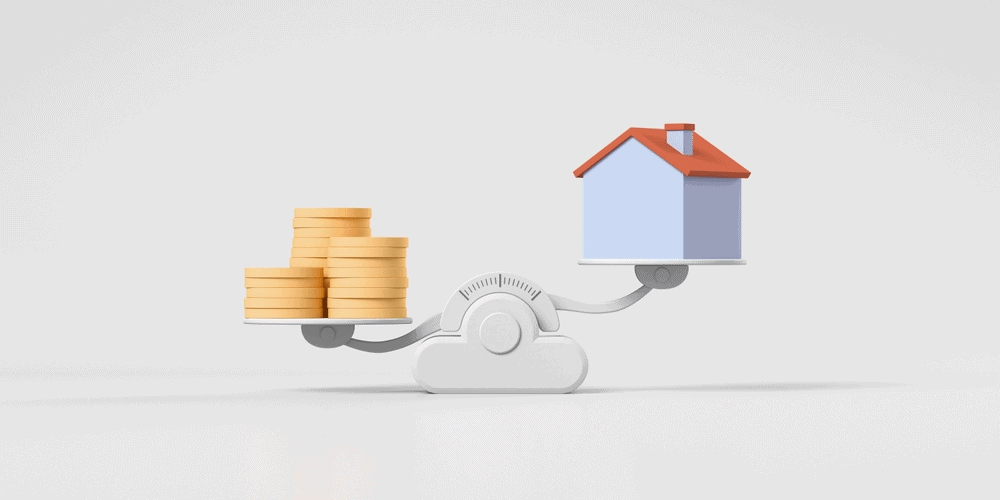What Is a Second Home? | What Is an Investment Property? | Home Loan Differences | Tax Implications | Should You Buy a Second Home or an Investment Property?
What’s the difference between a second home vs. investment property? Both terms refer to a property aside from your primary residence, but the difference is in how you intend to use that property.
A second home is a home you intend to live in during part of the year. An investment property is one you intend to rent out rather than live in. They have different lender requirements and mortgage rates, and they’re taxed differently.
Both options offer some flexibility. But depending on your situation, one may be more financially favorable than the other.
Second Home vs. Investment Property
|
🏡 Second Home |
💰Investment Property |
|---|---|
|
|
What Is a Second Home?
A second home is a residence you plan to live in for part of the year, in addition to your primary home. It’s sometimes referred to as a vacation home, but it could also be a home in a place you visit often for business or family or other non-vacation reasons. The IRS generally classifies the property as a second home if you use it as a residence and rent it for fewer than 15 days of the year.
If you regularly conduct business in a city, for example, a condo in that city can also serve as a second home.
What Is an Investment Property?
Investment properties are additional properties that owners typically use to generate income. An investment property could be a house, condo, multi- or single-unit property, commercial property, or property you flip for a profit.
Could your second home be an investment property? Maybe. Even if you live in the home for a large part of the year, the IRS will likely treat your second home as investment property if you rent it out as a source of income for 14 or more days, or 10% of the total days you rent it to others, whichever is greater.
Home Loan Differences: Second Home vs. Investment Property
Home loans operate differently for a second home vs. an investment property. It’s important you know the difference before finalizing your purchase.
Financing Requirements
Loan requirements for a second home are typically stricter than a primary residence.
If you’re looking to buy a second home, you may need to meet lender qualifications such as:
-
Buying property in a resort or vacation area
-
Not including the house in a timeshare or rental arrangement
-
Renting out the home for 180 days or fewer days per year
Loan requirements for investment property loans can be even more demanding.
Because borrowers are more likely to default on properties they don’t occupy, investment property loans are riskier for the lender, so many lenders require higher credit scores for investment property loans.
Mortgage Rates
Besides a higher credit score requirement, higher mortgage interest rates tend to be higher for investment property. This is partly due to the higher risk the lender takes on by financing it compared to a primary residence or second home.
Down Payments
Saving for a house is no small feat — you’ll often need a down payment of 5% to 10% for a second home and 15% to 25% or more for an investment property. To get an idea of how much you’ll need, ask your lender about down payment amounts when shopping for another property.
Rental Income
Rental income can boost your loan application to help you meet lender requirements. It’s pretty standard if you’re in the market to buy an investment property. However, you can’t typically use future rental income from a second home to qualify for a mortgage.
There might be exceptions, though. For example, government-backed mortgages like FHA loans let you use future rental income if you’re buying a multi-unit property and intend to live in one of the units.
Tax Implications of a Second Home vs. Investment Property
The good news is that both investment properties and second homes frequently come with tax benefits that can save you a fair amount of money.
The bad news is that the IRS has strict rules about when and how you can write off mortgage interest, property taxes, repairs, and utility expenses.
|
Tax Benefit |
🏡Second Home |
💰Investment Property |
|---|---|---|
|
Expense write-off |
Only if you also receive rental income and rent the property for 15 or more days |
Yes, for
|
|
Mortgage interest |
Deductible on up to $750,000 of mortgage debt ($375,000 if married filing separately) |
Deductible from rental income as a business expense |
|
Rental income |
Not usually taxable if property is rented fewer than 15 days per year |
Taxable if property is rented for 15 or more days per year |
|
Selling the home |
Generally must pay capital gains taxes on the full amount unless you used the property as your main residence for at least two of the past five years |
Can defer capital gains if you redirect funds into another investment property purchase |
Tax Benefits of a Second Home
The IRS has a lot to say about the tax benefits (and drawbacks) of a second home. You can enjoy a few tax advantages to help lower your tax bill:
-
Mortgage Interest: You can deduct mortgage interest on up to $750,000 of mortgage debt ($375,000 if married filing separately) on any personal residence, whether it’s your first or second home.
-
Rental Income: If you rent your home occasionally, you don’t have to report the rental income if you rent it out for fewer than 15 days per year.
-
Home Equity Loan Interest: If you have a mortgage on your second home and didn’t borrow against the equity of the first home, you can write off the interest of a home equity loan in order “to buy, build, or substantially improve the taxpayer’s home that secures the loan.”
-
Property Taxes: You can deduct $10,000 of your total property taxes from all your owned properties per tax return, or $5,000 if you’re married and filing separately.
Tax Drawbacks of a Second Home
However, one big downside is paying capital gains taxes on the entire profit if you sell your second home — unless you’ve lived in the second property for at least two out of the five years before selling it. That time does not have to be consecutive.
At that point, the second house would qualify as your primary residence, and you could exclude up to $250,000 in capital gains ($500,000 if married filing jointly).
Tax Benefits of an Investment Property
You’ll have to report rental income you receive and pay capital gains taxes on your profits from selling an investment property, but you can tap into several tax benefits:
-
Mortgage interest: You can deduct mortgage interest as a business expense for an investment property, which will lower your taxable income on your tax return
-
Repair costs: Any necessary repairs to keep the property in good condition are deductible, but elective renovations or anything similar that adds value to the property are not.
-
Capital gains avoidance: You can avoid paying capital gains tax on your property if you use a 1031 exchange to sell your investment property for a “like-kind” property — similar in “nature or character, even if they differ in grade or quality.”
Can You Claim Your Investment Property as a Second Home?
Homeowners can’t usually claim investment properties as second homes.
However, there is an exception: if you rent it out for fewer than 15 days per year. At that point, the IRS may classify the property as a second home.
While this would work in theory, it’s not a practical solution. If you only rent your home out for approximately two weeks per year, you’d miss out on rental profits a typical investment property would bring in.
Can You Turn Your Second Home Into an Investment Property?
If you want your second home to generate some income, you might turn it into an investment property. There are a few things to consider. First, understand that renting out your home as a source of income for 14 or more days could cause the IRS to classify your second home as an investment property. In that sense, turning your second home into an investment property is simple.
But you must also consider restrictions on the mortgage for your second house. Many lenders don’t let you rent out the property when getting a home loan for a second home or vacation property, while others let you occasionally rent it out.
🚨Be Aware: You could violate your mortgage terms if you turn your second home into an investment property.
Should You Buy a Second Home or an Investment Property?
When choosing between a second home and investment property, consider how you plan to use the property. If income is your primary goal, an investment property might be the best fit. But if you want a home away from home? A second home or vacation property is probably best.
Second Home: Better For Traveling
Having a second home can save you a lot of money if you frequently travel to a specific place for vacation or work. Paying for a decent hotel for long periods of time can get pricey fast, so having a second home can be the smarter financial option in the long run.
Investment Property: Better For Making Money
If you’re looking at real estate specifically from a money-making perspective, an investment property is the way to go. If you meet the stricter requirements for investment property loans or have enough cash to buy a house upfront, you can generate a lot of income from renting out a piece of property.
A second home can only be rented out for a profit for fewer than 14 days, according to the IRS, so an investment property can generate a much larger profit than a second home can.
Still Deciding? Talk to an Expert
An experienced real estate agent can help you navigate the nuances of second homes and investment properties — whether that’s finding you a dreamy beach house to escape to during cold winters or snagging a cheap investment property in an up-and-coming neighborhood that you can flip.
Recommended Reading
Frequently Asked Questions About Buying a Second Home vs. Investment Property
Is a second home considered an investment property?
The IRS considers a second home an investment property if the owner rents it out for profit for more than 14 days. Learn more about the difference between second homes and investment properties.
What are the disadvantages of owning a second home?
The biggest disadvantage of owning a second home is that you have to pay capital gains tax on it if you decide to sell it, unless you’ve lived there for two of the past five years (consecutively or not). Check out our list of advantages and disadvantages of owning a second home.
What qualifies as a second home for the IRS?
A property that is intended to be used as a home for more than 14 days or 10% of the days you rent it out during the tax year, whichever is greater, qualifies as a second home in the eyes of the IRS. Learn more about the difference between second homes and investment properties.
What qualifies as an investment property?
A property that is intended to be rented out for income for more than 14 days qualifies as an investment property. Learn more about owning an investment property.



